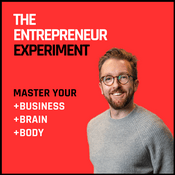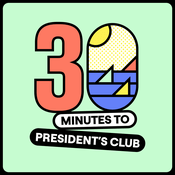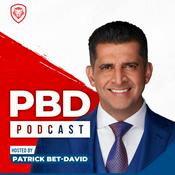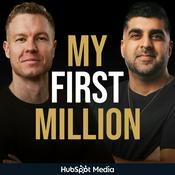Podcast Notes Playlist: Signal From The Noise: By Podcast Notes
Podcast Notes

Latest episode
55 episodes
PN Deep Dive: 📝 Secrets to Public Speaking Mastery, Hubervision, Peter Thiel, Exercise Science, Rich Barton - Zillow, HuberAddiction, True History of Native Americans
28/4/2025 | 17 mins.Get more notes at https://podcastnotes.org Get the full notes at Podcastnotes.org
Thank you for subscribing. Leave a comment or share this episode.PN Deep Dive: Alain de Botton, Huberman on Hormones, Elon on Future War, Pavel Tsatsouline w/ Hubs, Dostoevsky, All-In on DOGE, How to Take Over the World, and Graham Duncan
17/2/2025 | 37 mins.Get more notes at https://podcastnotes.org
Thank you for subscribing. Leave a comment or share this episode.- Get more notes at https://podcastnotes.org This member’s only content is a compilation of several podcasts that will teach you about the importance of mental models and how they can help you improve your decision-making process.
Get the FULL COLLECTION
Key Takeaways:
* Mental Model: Direction Over Speed
* If you’re pointed in the wrong direction, it doesn’t matter how fast you’re traveling
* Mental Model: Availability Bias
* Design your environment to the best of your availability to limit your temptation to perform unwise actions
* Mental Model: Hanlon’s Razor
* Don’t attribute to malice what can be attributed to stupidity. Don’t assume someone did something because they’re a bad person, assume they did it out of stupidity.
* Mental Model: George Mack’s Razor
* When presented with two options, choose the one that brings a greater amount of luck.
* Mental Model: Zeitheimer’s
* Every generation tends to assume their problems are the absolute worst – we forget about the daily struggles of our ancestors
* Our generation is complaining about social media addiction – people less than a hundred years ago were dying on battlefields during world wars
* Mental Model: Signal vs. Noise
* This mental model is all about how to distinguish the high-intensity/useful information (the stuff that actually matters) from the noise
* If a book has been around for 100 years, you can assume it’ll be around for 100 additional years (this is also known as the Lindy Effect)
Defining Mental Models
* A mental model is ways of taking principles from different disciplines and applying them to make better decisions
* Helpful mental models:
* Be careful of actions that would multiple your life by 0
* Don’t take any risk that might make your life go to zero
* E.g: It’s great if you exercise and don’t smoke, but if you drive drunk you could go to jail or end up dead
Mental Model: The Map is Not the Territory
* Check out Shane’s blog post on the topic
* A few examples:
* A balance sheet is the map of a business, but it doesn’t fully represent the company
* An employee satisfaction survey (a map) is only a glimpse of the entire terrain (everything going on within the company)
* “If you become exclusive to one map, you’re less likely to identify when the terrain changes” – Shane Parrish
* “There’s always an imperfect relationship between reality and the models we use to represent and understand them, but it’s necessary in order to simplify things because we can’t deal with the world in all of its complexity” – Shane Parrish
* Like online dating
* The “map” (someone’s profile) doesn’t match the overall person – they’ll often be completely different
* The size of your email list is a map, but it doesn’t tell you about the territory
* It doesn’t tell you about the open rates, the engagements, or whether people care if they receive the emails
* Business targets/projections are another example
* For one, they’re often pulled out of thin air
* The growth target doesn’t, in fact, indicate what’s possible
* “If you could 10x something, why would you be happy with 5x, and if 5x’ing something is, in fact, impossible, why would you be disappointed with 4x?” – Sam
Mental Model: The Unforced Error
* This mental model comes from Super Thinking: The Big Book of Mental Models by Gabriel Weinberg
* The concept: do all you can to prepare to avoid bad outcomes
* Ex: Dress well to avoid making a bad first impression
* Ex: Don’t text while driving to avoid getting in a car crash
* “An unforced error is the most basic way you can be wrong. Independent of all other circumstances, you done f**ked up.” – Chris
Mental Model: Anti-fragility
* This one originates from Nassim Taleb, author of Antifragile, and a few other classics – The Black Swan, Fooled by Randomness, and Skin in the Game
* The main idea – Become someone who thrives and improves from disorder
* Think of a glass cup: if you drop it on the floor (disorder), it breaks (AKA it’s fragile)
* How can you do this? – There are quite a few ways:
* Have multiple sources of income – this way, if you lose your job (disorder), you’ll be fine
* Exercise and build strength – if you stumble and lose your balance, you’re more likely not to hurt yourself
* Look for business opportunities where no matter what happens, you’ll experience an upside
Mental Model: Finding Good in the Bad
* This one originates from Josh Waitzkin in his first appearance on The Tim Ferriss Show
* It’s very easy to get bummed out when it rains and let it affect your mood
* Josh realized parents instill this in their kids by encouraging them to stay inside when it’s raining rather going out to actually enjoy the “bad” weather
* So, he flipped it. Josh taught his son to look at rain and think: “Oh, look at how beautiful it is! Let’s go outside and enjoy it!”
* George adds – “When everything’s going bad, I say ‘good.’ When everything’s going good, I say ‘bad.’”
* When times are good, it’s quite easy to take your foot off the gas
* When times are bad, it’s an opportunity to thrive
Mental Model: Surround Yourself With People You Admire
* “I definitely find the biggest influence in my output and the way I think is who I’m around” – George Mack
* Think of two versions of yourself:
* In one world, you spend most of your time around a positive and motivational person (like David Goggins)
* In another world, you spend most of your time around a sloth (the type of person who always has negative blinders on)
* After a year, imagine these two people meet – they’ll be completely different!
* High agency people actively seek out those they admire and want to emulate
* Chris thinks David Perell largely fits this bill – “He’s always the dumbest person in the room in one of multiple domains and he keeps changing the domain””
Mental Model: Directional Arrows of Progress
* This one comes from Josh Wolfe (as discussed in these Podcast Notes). Here’s how Josh explains it:
* “The half-life of technology intimacy” is a trend related to how we interact with our computers:
* 50 years ago, you had a giant computer the size of multiple refrigerators sitting in the corner of a room
* The way you would interact would be to flip it’s switches, and pull plugs etc.
* 25 years ago – we first got personal computers
* How did we interact with them? – Mainly through a keyboard and a computer mouse
* 12.5 years ago – the dominant form of computers became laptops
* Now it’s physically on your lap, so the computer has gotten closer to you
* 6.5 years ago – the iPhone
* It’s the last thing we touch at night, as well as the first thing we touch in the morning
* You “swipe” it and “tap” it
* The only physical barrier with the human body is a thin film of fabric in your pants
* 3.5 years ago – the smartwatch
Get the FULL COLLECTION
Thank you for subscribing. Leave a comment or share this episode.
More Business podcasts
Trending Business podcasts
About Podcast Notes Playlist: Signal From The Noise: By Podcast Notes
We take notes on the best podcasts so you don't have to. Subscribe to this playlist in your podcast app to automatically get all the episodes we've taken notes for along with the notes themselves! Our awesome notes read out loud so you can listen to them instead of reading them
Podcast websiteListen to Podcast Notes Playlist: Signal From The Noise: By Podcast Notes, The Prof G Pod with Scott Galloway and many other podcasts from around the world with the radio.net app

Get the free radio.net app
- Stations and podcasts to bookmark
- Stream via Wi-Fi or Bluetooth
- Supports Carplay & Android Auto
- Many other app features
Get the free radio.net app
- Stations and podcasts to bookmark
- Stream via Wi-Fi or Bluetooth
- Supports Carplay & Android Auto
- Many other app features


Podcast Notes Playlist: Signal From The Noise: By Podcast Notes
Scan code,
download the app,
start listening.
download the app,
start listening.


































